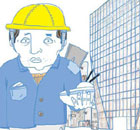Editorials
Eyeing housing prices
(China Daily)
Updated: 2010-01-15 07:52
 |
Large Medium Small |
For those who expect recent government measures to stanch rising home prices, the jury is still out.
Two things point to why the measures are not yet working: The newly released data on home prices stating that China's property prices rose at the fastest pace in 18 months in December, and the fact that the government has yet to map out a feasible and fundamental strategy to stabilize housing prices.
The country's residential and commercial real estate prices in 70 cities climbed 7.8 percent year-on-year, the National Development and Reform Commission said yesterday. Prices hiked 5.7 percent in November. Prices of new homes shot up 9.1 percent after it grew 6.2 percent in the previous month.
| ||||
In Beijing, for example, housing prices rose by 9.2 percent in December year-on-year while new home prices jumped by 11.3 percent, according to official data. But anecdotally, housing prices could have risen by more than 50 percent or even doubled in 2009 in some corners of the city.
Admittedly, there must be a gap between official statistics and anecdotal information. But it has to be pointed out that the misunderstanding of the public perhaps comes from their practice in mainly eyeing on the prices of commercial housing and failing to take the price of affordable housing into account.
The government seems to have noticed the seriousness of soaring home prices, which has led to discontent among many people who cannot afford a home, and the rising possibility of bursting asset bubbles. It sent an unequivocal signal of preventing speculative deals by announcing a slew of policies to stabilize prices since early December.
But the recent measures taken by the government, be it a sales tax increase or the ban on land hoarding, are much like the measures enforced two years ago, when the first round of home-price increases prompted the government to take action. People are justified in asking whether government measures will really work this time.
While those measures are necessary, the country needs to reassess its development strategies if it is to tame housing prices.
Since the country's recovery from the Asian financial crisis at the turn of the century, the government has gradually taken the real estate sector, together with the auto industry, as major pillars of its economic expansion. The government believes that these two sectors can stir up activities in a number of related industries to grow within the overall economy.
Today, real estate investment contributes to about 10 percent of China's economic output, according to Capital Economics Ltd. If housing prices drop, it will dampen investment in the sector and many other related industries as well.
Early last year, the country's home prices dropped briefly. But the fear that current home prices will trigger another economic recession is believed to have made policymakers take new measures, such as tax cuts, to bail out the industry.
Therefore, the country needs to accelerate its pace in restructuring its investment-centered economy, making it more consumption-driven, so that it can reduce dependence on sectors such as real estate for its more balanced economic expansion.
(China Daily 01/15/2010 page8)













